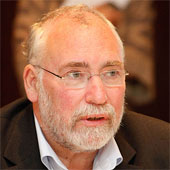Liberalism and Globalization
What is the value of liberalism in a global society?
July 19, 2002
Let's face it. No matter where you live, all societies carry baggage — and a considerable amount of it. But, in a nutshell, what distinguishes successful societies from those that are not is that dynamic societies are the ones that know what to abandon — and when.
China, for example, is essentially a Confucianist culture. Confucianism is an ideological system that places education at a very high level of priority. But it is also a system which strongly discriminates against women.
Contemporary Chinese societies have continued to carry the emphasis on education — but they have smartly discarded the traditional discrimination against women baggage.
Rest assured, if China were still binding its women's feet, there would be no spectacular economic growth in China, Hong Kong or Taiwan.
The fact that China no longer binds women's feet may make the Chinese feel less "Chinese". But it lets China move ahead economically, politically — and socially.
What has allowed the Chinese to make these choices? What allows similar changes to occur in other regions and cultures?
Ultimately, what has transformed cultural legacies into dynamic engines of growth, welfare and prosperity — in both the material and spiritual domains — has been the liberating force of liberalism.
Confucianist scholars such as Kang Youwei and Liang Qichao, the Hindu scholar Ram Mohun Roy and the numerous Christian liberals and humanists are all from different cultures. But also all share a common goal of sorting out their respective ideological baggage to see what works — and what doesn't.
The potential for change is evident even in cultures which are today widely seen as almost a lost cause. Consider the Arab/Muslim world.
Perhaps surprisingly to outsiders, a liberal tradition — a tradition of sorting through the cultural baggage — does exist in Arabic and Islamic thought.
The Tunisian scholar, the late Albert Hourani, demonstrated this vividly in his magnificent book, Arabic Thought in the Liberal Age (1968).
He described how, in the late 19th and early 20th centuries, thinkers and writers such as Jamal al-Din al-Afghani developed a powerful stream of Muslim thought along lines comparable to the evolution of secular and liberal thought in Europe.
And, surprising as that may sound, Al-Afghani's agenda of reform and liberalism did not prevent him from being a fervent nationalist and anti-imperialist.
Ultimately, however, as Hourani's book shows, liberalism came to be aborted in most of the Middle East. How so? Well, opponents of liberalism in the Islamic world opted for an easy, but effective, move.
They equated liberalism with "westernism". And that allowed them to dictate that all that old baggage — whether effective or not — be retained. Had the equivalent happened in China, the Chinese would still be binding women's feet …
In fact, we would all do well to remember that the West's ideological origins are not at all liberal — even though it is correct that liberalism has emanated primarily from the West.
After all, dogmatic literal interpretations of the Bible allowed the Florentine government to place Galileo under house arrest — for saying that the earth turned around the sun.
Even today, fundamentalist Christians in the United States appear not prepared to give up the fight when they seek to ban the teaching of Darwinism in schools, for example.
Now I do realize that intellectual curiosity and cultural openness are not permanent features of any society. Take Japan. In the 1960s, the country was a hothouse of cultural curiosity, openness, import and experimentation.
For whatever reason, in the course of the 1980s, Japan switched off. It has become far, far more inward-looking.
In fact it has strangely turned into a somewhat masochistically narcissistic society, which — despite its great potential — goes a long way to explain its present social and economic decline.
All of that is why I am convinced that liberalism is a universal doctrine, the most basic premise of which is to oppose dogmatism in any form. Hence its advocacy of tolerance, openness and pluralism. And hence its attraction across many cultures.
So the next time you hear criticisms of "neo-liberalism," keep in mind the huge value of the underlying premise in that concept on a broader scale.
Whatever is bothersome about the "neo" part, liberalism as such appears to be nothing less than the key to allowing a society to operate successfully in the modern, globalized world. That is a blessing, not a curse.
Read previous
Chirac's France in the 21st Century
July 18, 2002
